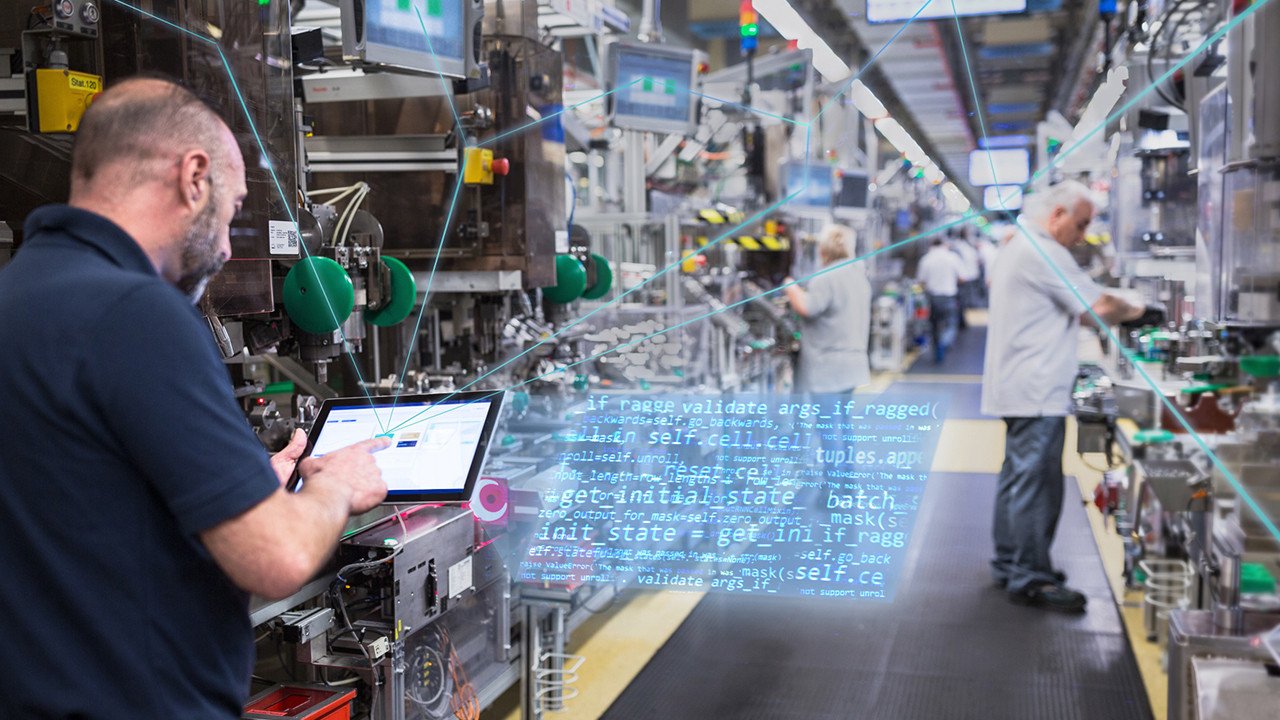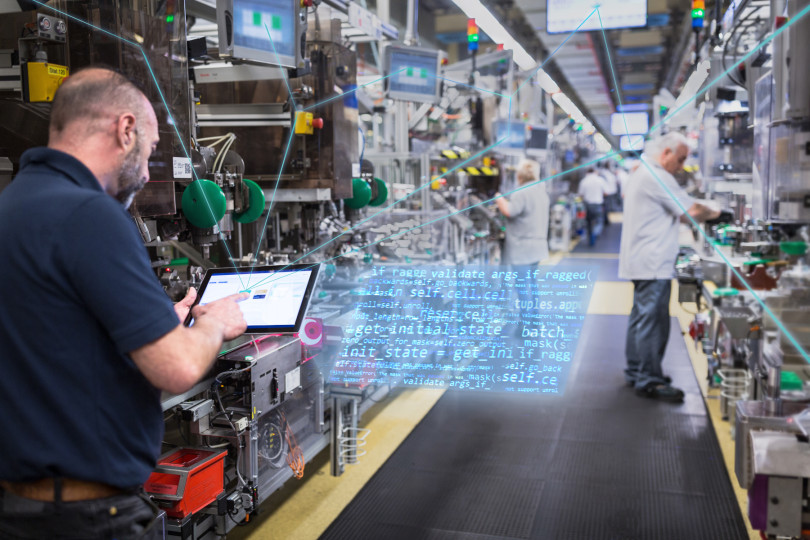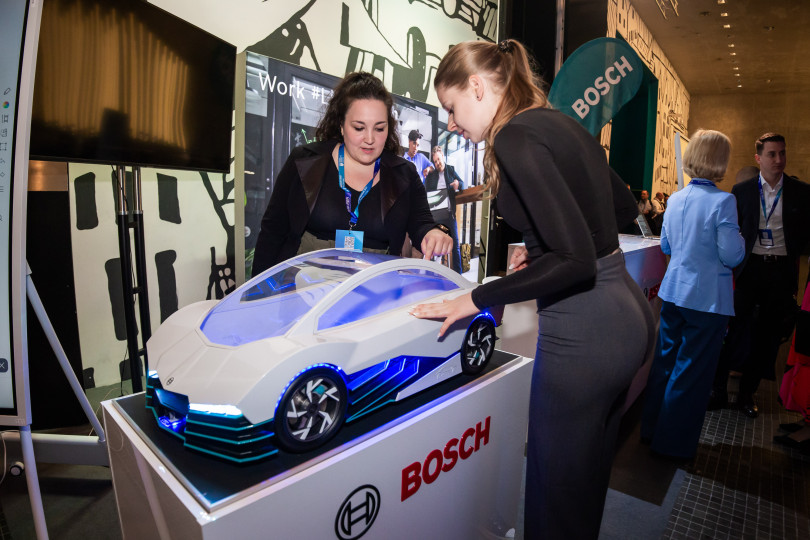Bosch's strategic vision is clear: artificial intelligence is the defining technology of the decade ahead, driving innovation and industry. The company's experts provided insight into the current industrial trends of AI and the diverse possibilities of its application at the AI Symposium organized by the HUN-REN Hungarian Research Network in Budapest on the occasion of Artificial Intelligence Month. “Artificial intelligence is not merely a technological breakthrough – it is a turning point in human civilization. We stand on the threshold of a new era, and if we do not take an active role in shaping its development, others will write the rules of the future for us. That is why it is essential for Hungary and the international scientific community to work together on open, transparent, and human-centered AI solutions that are not only competitive but also serve the common good,” said Roland Jakab, CEO of HUN-REN.
A new era in innovation: artificial intelligence in focus
AI is bringing explosive development not only to the creative and knowledge sectors but is also playing a decisive role in more and more products and in the manufacturing process itself. Transformation in the industry can bring higher quality and reliability, faster product development, reduced production costs, and improved sustainability. “The truly significant, game-changing innovations come in waves and make their way. At Bosch, we are prepared and are already active participants in the new era of innovation, hallmarked by artificial intelligence. We are proud that the Bosch Group in Hungary, as a prominent professional partner of the Budapest AI Symposium 2025, contributes to the cooperation and common success of the domestic and international AI profession," emphasized Dr. István Szászi, Representative of the Bosch Group in Hungary and the Adriatic region.
Preparing for the future: no Bosch product without AI
Bosch is fully committed to artificial intelligence: every Bosch product has AI or has been developed or manufactured with its help. At Bosch, more than 5,000 experts are currently working on AI-based solutions worldwide, almost 200 of whom work at the Hungarian group. Bosch has filed more than 1,500 patents in the field of AI in five years, which is an outstanding number in Europe. So far more than 65,000 associates have completed training related to AI at the Bosch AI Academy, and more than a thousand colleagues in Hungary have participated in the training. “At Bosch, we are already preparing for the future by working to build a broad base of expertise and knowledge in collaboration with the academic sector, particularly in the field of AI foundation models. This joint effort enables us not only to stay up to date with the highest emerging global industry standards, but also to actively shape and significantly contribute to their development through our products and solutions,” emphasized Zoltán Karaffy, Director of Digital Transformation at Robert Bosch Kft. during his keynote speech at the AI Symposium in Budapest.
Cars that think like humans might be the future
Advanced driver assistance systems (ADAS) are already part of most modern vehicles, but Bosch is also developing neuromorphic AI, i.e. AI inspired by the human brain, that can make ADAS systems significantly more efficient.
Neuromorphic computing refers to the development of hardware and software systems that mimic the functioning of the human brain, with particular attention to the communication of neurons and the organization of neuronal networks. Neuromorphic computing can take the capabilities of driver assistance systems to a new level by offering faster, more reliable, more flexible and more energy-efficient solutions for real-time sensing, supporting rapid decision-making, often required within seconds. From the perspective of accident prevention, it is critical that the system's reaction time is minimal. Vehicles use dozens of sensors (radar, lidar, camera, ultrasound, etc.). Neuromorphic architectures, which work like the brain, can handle large amounts of data generated by sensors more quickly and efficiently. In addition, neuromorphic chips consume several orders of magnitude less power than the processors of traditional ADAS systems. An additional advantage of the developments is that neuromorphic systems are able to learn and adapt to the environment, such as traffic situations, in real time. This allows neuromorphic ADAS systems to dynamically respond to unusual or unknown traffic situations.
The era of “black boxes” is over: AI can be a transparent decision supporting partner in smart factories
Semiconductors are present in almost every electronic device from smartphones to vehicles. Semiconductors also play a key role at Bosch in many areas of mobility solutions and industrial technology: from controlling the engine and brake systems of cars to sensors used in airbags or enabling autonomous driving. In semiconductor manufacturing, early failure detection and filtering based on artificial intelligence is particularly important, as it can prevent a small, but important component from later causing the failure of a high-value finished product. “We are working on AI-based solutions that not only filter out defective parts at a very early stage of production but also provide an explanation of the causes of defects so that they can be prevented later,” said Itilekha Podder, artificial intelligence and data scientist at Robert Bosch Kft., a guest at the AI Syposium roundtable discussion on industrial AI solutions.
For end users, this means increased safety, better performance, greater product reliability and longer lifespan of automotive components. From an economic and environmental perspective, AI-based methods help to achieve faster time-to-market, and by reducing the failure rate, they enable lower production costs and more sustainable production. “Bosch's industrial AI developments point towards so-called explainable artificial intelligence in industrial applications, where AI is no longer just a mysterious black box, but can be a reliable decision supporting partner,” emphasized Itilekha Podder, an expert at Bosch. AI solutions operating on this principle support transparent automation in smart factories, help users and engineers understand and trust AI, and more easily find and correct the cause of potential AI errors.
AI stars: VANDA and the unpacking robot
At the Budapest AI Symposium, Bosch's industrial AI solutions included an industrial unpacking robot developed in collaboration with ELTE, which has already started working at Bosch's Hatvan site, the largest manufacturing center for the group's automotive electronics division in the world. The new equipment, created by combining artificial intelligence and robotics, offers an efficient and flexible solution for the automated unpacking, sorting, and organization of raw materials, parts, and components that arrive in factories in a wide variety of packaging on a daily basis.
Bosch's project called VANDA, which supports the development of self-driving functions by generating synthetic data, also debuted at the event. Synthetic data are artificially generated image or sensor data that simulate real environmental conditions (e.g. urban traffic, night driving, rain, snow) and help in faster AI development processes and modelling rare or dangerous traffic situations.
Mónika Hack
+36 70 510 5516
Bosch has been present in Hungary since 1898 with its products. After its re-establishment as a regional trading company in 1991, Bosch has grown into one of Hungary’s largest foreign industrial employers with currently eight subsidiaries. In fiscal 2023 it had total net sales of 2.207 billion forints and consolidated sales to third parties on the Hungarian market of 343 billion forints. The Bosch Group in Hungary employs more than 18,300 associates (as of December 31, 2023). In addition to its manufacturing, commercial and development business, Bosch has a network of sales and service operations that covers the entire country.
The Bosch Group is a leading global supplier of technology and services. It employs roughly 417,900 associates worldwide (as of December 31, 2024). According to preliminary figures, the company generated sales of 90.5 billion euros in 2024. Its operations are divided into four business sectors: Mobility, Industrial Technology, Consumer Goods, and Energy and Building Technology. With its business activities, the company aims to use technology to help shape universal trends such as automation, electrification, digitalization, connectivity, and an orientation to sustainability. In this context, Bosch’s broad diversification across regions and industries strengthens its innovativeness and robustness. Bosch uses its proven expertise in sensor technology, software, and services to offer customers cross-domain solutions from a single source. It also applies its expertise in connectivity and artificial intelligence in order to develop and manufacture user-friendly, sustainable products. With technology that is “Invented for life,” Bosch wants to help improve quality of life and conserve natural resources. The Bosch Group comprises Robert Bosch GmbH and its roughly 470 subsidiary and regional companies in over 60 countries. Including sales and service partners, Bosch’s global manufacturing, engineering, and sales network covers nearly every country in the world. Bosch’s innovative strength is key to the company’s further development. At 136 locations across the globe, Bosch employs some 86,900 associates in research and development, of which nearly 48,000 are software engineers.
The company was set up in Stuttgart in 1886 by Robert Bosch (1861–1942) as “Workshop for Precision Mechanics and Electrical Engineering.” The special ownership structure of Robert Bosch GmbH guarantees the entrepreneurial freedom of the Bosch Group, making it possible for the company to plan over the long term and to undertake significant upfront investments in the safeguarding of its future. Ninety-four percent of the share capital of Robert Bosch GmbH is held by Robert Bosch Stiftung GmbH, a charitable foundation. The remaining shares are held by Robert Bosch GmbH and by a corporation owned by the Bosch family. The majority of voting rights are held by Robert Bosch Industrietreuhand KG. It is entrusted with the task of safeguarding the company’s long-term existence and in particular its financial independence – in line with the mission handed down in the will of the company’s founder, Robert Bosch.
Additional information is available online at www.bosch.hu, iot.boschblog.hu, www.bosch.com, www.iot.bosch.com, www.bosch-press.com, www.twitter.com/BoschPresse





